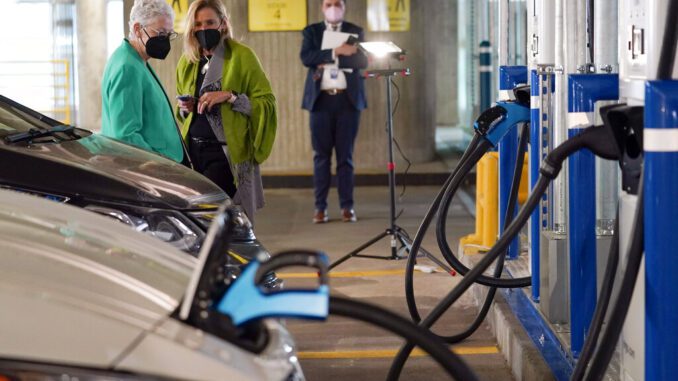
With gasoline prices at decade-highs, President Joe Biden is on the defensive — for good reason.
On the campaign trail, Biden proclaimed, “We’re going to end fossil fuels.” Now, given just one year in the White House, he has already cancelled a major international oil pipeline, blocked energy development in Alaska, reversed key reforms to the meddlesome Waters of the United States rule, and appealed for a sky high “social cost of carbon.”
Along with deflecting blame to Russia, OPEC, oil companies, and Wall Street, one particularly concerning parry from President Biden is his argument that Americans can buy electric vehicles and, supposedly, insulate themselves from commodity shocks.
This claim merits special scrutiny. Electric vehicles — specifically, the batteries and motor technologies that power them ― rely on a global supply chain that is geopolitically thornier than the fuels that power most of our cars now.
Just last year the International Energy Agency (IEA) warned of the risks posed by going all-in on EVs. As IEA explains, a typical electric car requires over 400 pounds of critical minerals — including cobalt, copper, nickel, and manganese. That’s six times more the mineral inputs required than for a normal car.
The problem isn’t simply the need for minerals, however, it’s where we would need to get them. Put bluntly, the supply chains for the cobalt, lithium, and rare earth elements that EVs need are controlled by China. According to IER, Chinese entities process more than half of the world’s lithium and cobalt, and nearly 90 percent of its rare earth elements.
The United States, the U.S. Department of Energy (DOE) noted in 2019, “is not a major battery mineral producer.” With Biden’s goals, logic would suggest a major push to become a mineral powerhouse. Instead, little has changed. In fact, the Biden administration is exacerbating this problem with decisions like its January 2022 rescission of mining leases in Minnesota.
The political back-and-forth over mining is of particular interest to North Carolina, which one mining company has called America’s “cradle of lithium.” While development of this domestic resource would avert some of the EV supply chain issues, many North Carolinians are reluctant to see dramatic changes to the regional landscape.
Geopolitics aside, the Biden administration’s primary motivation is the alleged environmental benefits of EVs. These claims, too, need a closer look.
Because the U.S. electric grid is powered mostly by natural gas and coal, electric vehicles don’t cut greenhouse gas emissions nearly as deep as is often assumed. According to environmental economist Nader Sobhani, the existing $7,500 electric vehicle tax credit for new EV buyers is about $5,000 too high if we judge by the emissions that EVs actually eliminate.
North Carolina’s electricity mix consists mostly of natural gas and nuclear energy, making EV emissions better in the Tar Heel State than most other U.S. locations. According to DOE, a North Carolina EV generates 73-percent lower greenhouse gas emissions than a gasoline vehicle annually. The benefits are tempered, however, when taking into account a vehicle’s entire lifecycle. According to IEA’s global estimates, when accounting for battery production, vehicle manufacturing, and battery recharging via electricity, the emissions from an electric vehicle are just 50-percent lower than the greenhouse gas emissions of a normal car over a standard ownership period.
Lastly, but perhaps most importantly, the claim that electric vehicles eliminate local air pollution is false. Tailpipe emissions are indeed eliminated, but cars generate more than just tailpipe emissions. A University of Edinburgh research team found in 2016 that non-tailpipe sources —think: brakes and tires — account for more than 85 percent of traffic-generated particulate matter. Because EV batteries are so heavy, EVs actually weigh more than comparable cars and, therefore, could make this issue even worse.
As of this writing, the national average for a gallon of gasoline is at more than $4.25. The shock to the global oil market caused by Russia’s Ukraine invasion is a big part of that, but well before Vladimir Putin initiated his attack, Joe Biden began executing his own plans, which have included driving up the price of reliable energy from Day 1 in the White House.
Biden’s defense that our energy situation is the product of malign foreign forces is disingenuous. Furthermore, if the U.S. pursues Biden’s stated goals to the letter, we’ll be in a far worse position geopolitically than we are today, with very little to show for it environmentally.
Jordan McGillis is Deputy Director of Policy for the Institute for Energy Research in Washington, DC
